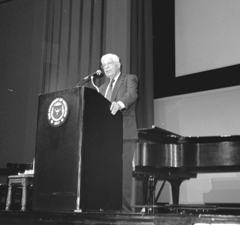The University Record, October 25, 1999 By Jane R. Elgass

At 83, newsman Daniel Schorr is accustomed to being able to “out-age” those around him, but said that probably wasn’t the case Oct. 17 when he delivered the keynote address at the Turner Geriatric Clinic’s celebration of the United Nations International Year of Older Persons.
Schorr received the Geriatric Center’s Outstanding Lifetime Achievement Award and eight others from the area received Turner Geriatric Clinic Community Lifetime Achievement Awards during the afternoon event at Rackham Auditorium.
To give the audience a sense of what it is to be 83, Schorr, who is National Public Radio senior news analyst, cited some of the things he didn’t have in his younger years—nylons, Saran wrap, ballpoint pens, nuclear bombs and Xerox machines. “Software” was not in the dictionary, grass was not something you smoked, you cooked in a pot and Coke was something you drank.
He’s always considered “fast food” a contradiction in terms. “You don’t eat food during a fast,” he quipped.
Schorr’s talk was peppered with anecdotes from his life as an international journalist, including his first lessons in the most important aspects of radio and TV reporting.
He gave his first radio broadcast in 1948 from Amsterdam when he was a stringer for ABC. “There wasn’t even a cable then,” he noted. “Everything was done by short-wave, which consisted mostly of a lot of crackling.”
He was told his report could be no more than two minutes and he worked down a draft that started out as a 10-minute presentation. When finished, he asked someone at the controls in New York how he’d done. “Great. You got off on time,” was the reply.
“Filling a chunk of time was what was important,” Schorr said, “not the content.”
Though confident in his journalistic abilities, he was not confident about appearing on television and some years later, prior to appearing on TV, asked a colleague for the secret to success.
“Sincerity” was the reply. “If you can fake that, you’ve got it made.”
“I didn’t learn sincerity very well,” Schorr said. “I couldn’t fake it, so I chose a profession other than TV.”
The last of Edward R. Murrow’s legendary CBS team still active in journalism, Schorr said one of his most difficult reporting moments came in 1973 during open hearings on Watergate, which were being broadcast live.
He and the other networks’ reporters were waiting to be “first on the air” with a list of individuals branded as “enemies” by the White House. When handed the list, he immediately began reading the 20 names, coming up short when he reached number 17—“Daniel Schorr, a real media enemy.”
It was very difficult being “the pawn of a story you’re trying to report,” he said.
His advice to the audience: “What you like to do, do. The people here could have chosen to retire. Instead they do things for other people. I’m being honored, but the honor is to me.”
Community Lifetime Achievement Award recipients
William E. Alexander, a member of the state Commission on Aging, community gardener and good gatherer.
Willa Bates, an exceptional mother and grandmother noted for her inspirational work in her church and community.
Lola Jones, a pioneer in researching and disseminating the African American history of Ann Arbor and a founder of the African American Historical Museum.
Maxine Miles, noted for leadership in environmental education and land conservation who currently runs a bed-and-breakfast.
Harold Nitbzerg, a leader in social work and lifelong advocate of community mental health.
Ernestina Parravano, “an angel sent to help others with all sorts of problems—health, financial and emotional.”
William Whouie, known for his benevolence as a businessman and his compassionate ministry for those suffering addiction problems.
Alma Ford Wooll, co-founder of the Alzheimer’s Disease Association of Southeastern Michigan and a Turner peer volunteer and support group leader.
The nearly 100 individuals who were nominated for achievement awards also were recognized at the celebration ceremony.

